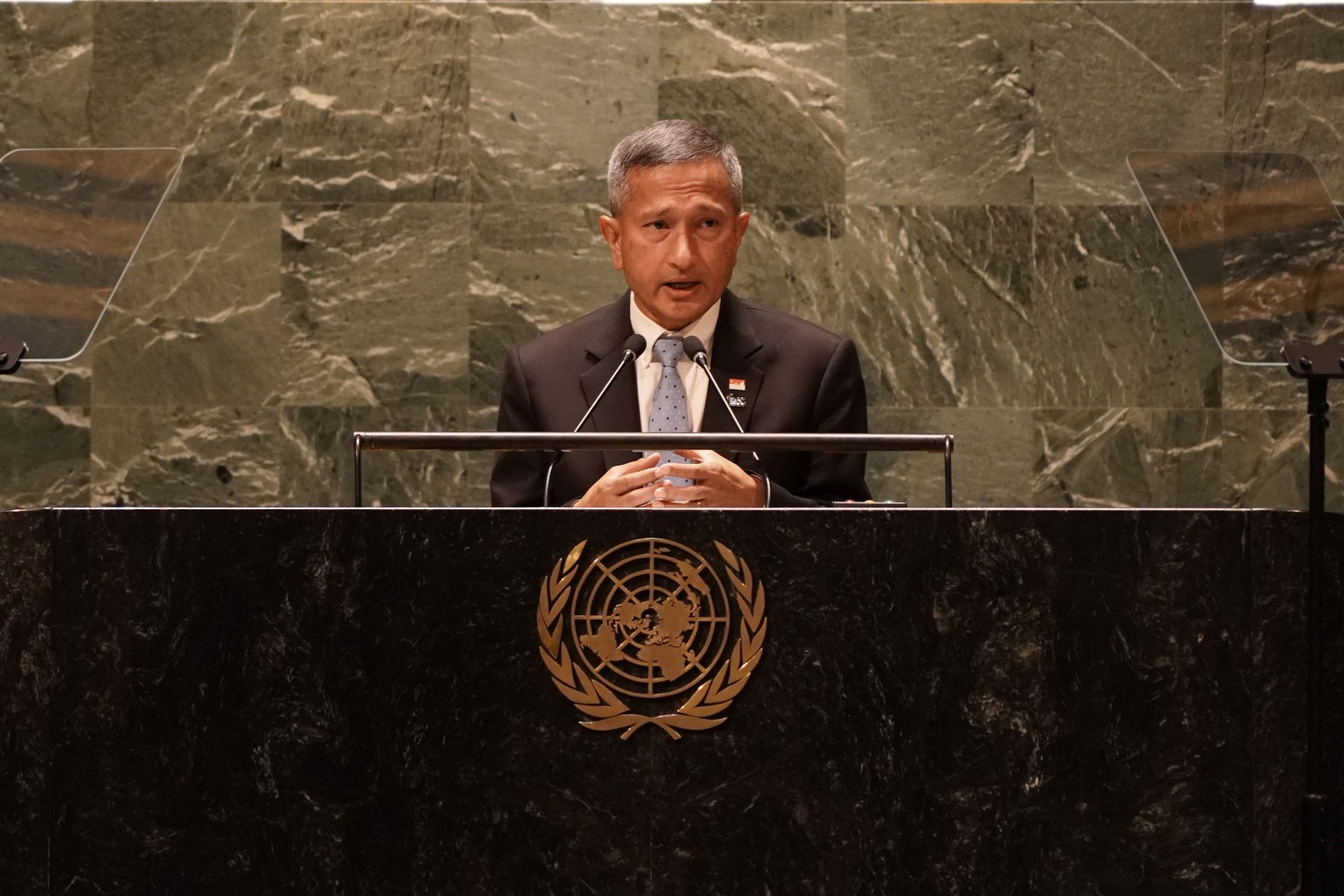UN Convention on the Law of the Sea of even greater relevance today: Vivian
Sign up now: Get ST's newsletters delivered to your inbox

Minister for Foreign Affairs Dr Vivian Balakrishnan speaks at the plenary meeting of the United Nations General Assembly on April 29, 2022.
PHOTO: MINISTRY OF FOREIGN AFFAIRS, SINGAPORE
Follow topic:
WASHINGTON - Singapore paid tribute on Friday (April 29) to the United Nations Convention on the Law of the Sea (Unclos), calling the landmark international agreement critically important to the rule of law in the oceans and of even greater relevance today.
Unclos, which was adopted 40 years ago, provides a universal legal framework on the governance of the ocean, Foreign Minister Vivian Balakrishnan noted in a brief speech at the UN headquarters in New York.
The institutions that Unclos created have adapted to new challenges and made critical contributions to global peace and security, he said.
Dr Balakrishnan, who concluded his three-day working visit to New York on Friday, was speaking at a high-level meeting to mark the 40th anniversary of the adoption of Unclos.
"Unclos was envisioned and developed at a time when many coastal states were making increasingly extensive claims to unilaterally expand their jurisdiction and their rights to exploit the ocean's resources," he said.
"Unclos brought order and predictability to the governance of our oceans," he added.
The Singapore Foreign Minister called Unclos even more relevant today, given the rise of new issues such as the exponential growth of maritime shipping and the impact of climate change on the oceans, from the degradation of coastal and marine ecosystems to rising seas and ocean acidification.
Dr Balakrishnan said that Singapore will continue to support multilateral efforts to address these issues, citing its work to advance the Biodiversity Beyond National Jurisdiction treaty currently being negotiated.
Singapore is also actively participating in the negotiations for a Code of Conduct (COC) in the South China Sea, he noted.
"We are committed to negotiating an effective and substantive COC that is in accordance with international law, in particular Unclos, and that also safeguards the rights and interests of all parties in the South China Sea," he said.
Dr Balakrishnan urged all countries to reaffirm their commitment to the convention.
He also urged all remaining states not already party to Unclos to accede to it, or to ratify it as soon as possible.
Most UN member states - 164 out of 193 - have ratified Unclos, while 14 member states have signed but not ratified the convention.
The United States is among the holdouts, although it recognises Unclos as customary international law.
Singapore, a small island state that relies heavily on maritime trade, considers Unclos especially crucial and is proud to have contributed to its adoption, said Dr Balakrishnan.
Also delivering a keynote address at Friday's session was Singapore's Ambassador-at-Large Tommy Koh, who was the president of the Third UN Conference on the Law of the Sea, which resulted in the adoption of Unclos.
Professor Koh made the case that Unclos should be treasured for several reasons.
For instance, he said, it has a unique system of compulsory dispute settlement, and reflects the interests of all countries, including developing ones.
"Unclos is a victory for the UN, a victory for international law and the rule of law and a victory for the peaceful settlement of disputes. This victory is especially precious in our difficult times. I am glad I was able to play a very small role in this story," Prof Koh said in a pre-recorded video message.
Dr Balakrishnan also delivered a statement on behalf of Denmark, Grenada, Kenya, Portugal and Singapore, all of which requested the convening of Friday's meeting.
They called on all states to fully and effectively implement their obligations under Unclos without selectivity, and urged the international community to take concrete steps to support ocean conservation and sustainability.
"Urgent multilateral action within the framework provided by Unclos is needed to ensure the health of our oceans," said Dr Balakrishnan.
Others who spoke at the session included International Court of Justice president Joan Donoghue, as well as the heads of three institutions established by Unclos - International Seabed Authority secretary-general Michael Lodge, UN International Tribunal for the Law of the Sea president Albert Hoffmann, and Commission on the Limits of the Continental Shelf chairman Adnan Rashid.

